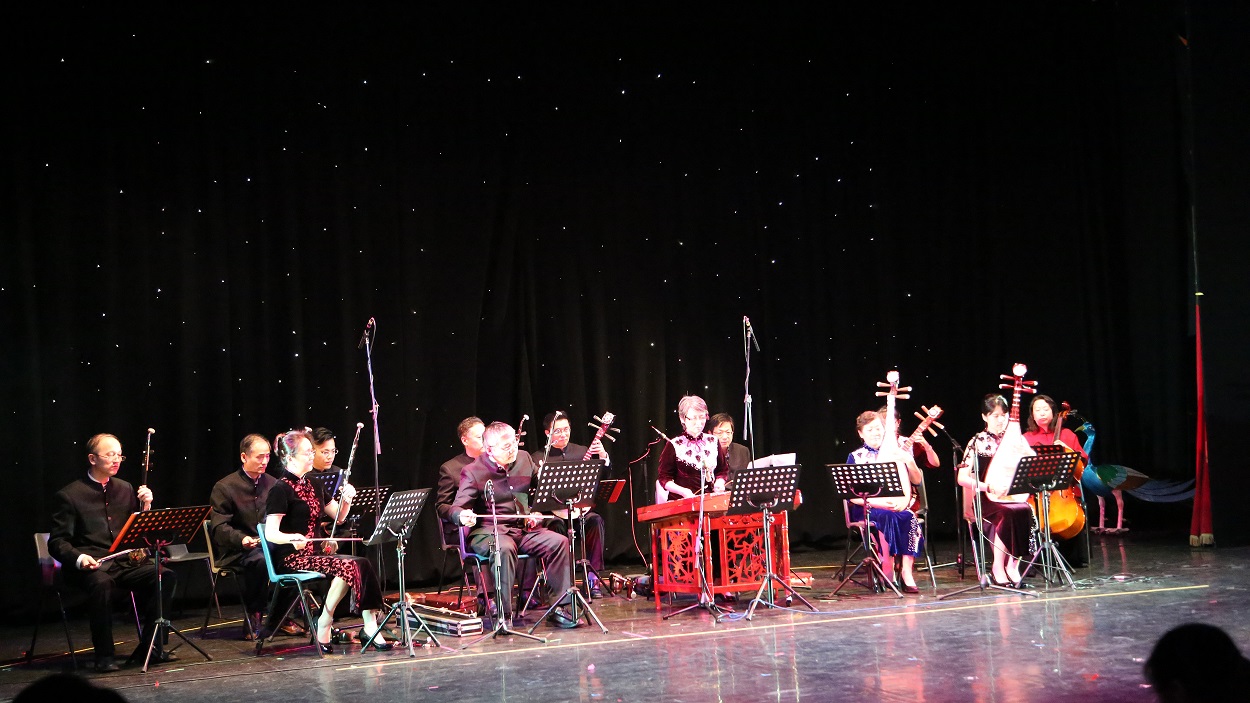The Manchester-based Chinese Music Ensemble, Oriental Breeze, performed an hour long concert of music played on traditional Chinese instruments at St. Paul's Church in Sale, Greater Manchester this afternoon.
The ensemble comprises 14 musicians who all play a variety of instruments totally foreign to our usual and familiar Western ones. But what I did find rather incongruous and odd was that the ensemble included a cello. And oh how ugly the cello looked when placed next to these beautiful Chinese instruments!
It was an interesting setting too. The ensemble played in front of the choir stalls and amidst a backdrop of distinctly Christian stained glass and crosses, with the 14 musicians, dressed mostly in Chinese costume looking a little out of place. However, once you started to listen to the music and enjoy the concert, the surrounds were forgotten.
Although the Chinese New Year was a fortnight ago, today is also important because it is the eve of the full moon and the Chinese Lantern Festival: the music and concert therefore were appropriate for both festivals.
The first thing I noticed when they played was that there is no conductor. Yet they keep perfect time and all observe the same dynamics in the music. I think perhaps our western musicians might have something to learn from this! Secondly, I noticed just how delicate and intricate most of the instruments are. Again, our western counterparts look ugly in comparison. And thirdly, you couldn't help but notice how skilful the players were.
To give you some idea of the instruments they were playing then there were....
1) Erhu. - This is probably best described as a two-stringed Chinese violin. 2) Pipa - a pear-shaped lute. 3) Dizl - a wooden Chinese flute. 4) Zhongruan - another style of lute, more akin to the banjo in shape. 5) Guzheng a Chinese zither. 6) Yangqin - a Chinese dulcimer.
Fortunately the names of these instruments were printed on the programme, and one of the ensemble explained a little about each and we heard them played in turn. So the concert was not only entertaining but educational too!
For our further education it was explained that Chinese music uses the pentatonic scale. This means basically that their 'octave' is five whole notes rather than our western eight (hence the word ‘octave’). Their musical notation is also a little strange. Rather than using staves with notes that we would understand they use a numbering system, where 1=doh, 2 = re, 3=mi etc to 7. Then for semitones they annotate this by putting a sharp (#) above and to the left of the number!
As for the music itself, the ensemble played 11 short pieces all written within the last 100 or so years, but showcased their instruments beautifully. Most were full ensemble pieces but there were a couple which used only one or two instruments and it was these that actually sounded to my uninitiated ears the most Chinese of all of them! We were told a little about each piece before it was played and this was very interesting. We were also told the names of the composers, but since they were not in the programme, I have absolutely no chance of being able to write their names from just one hearing of them in Chinese!
I would have preferred to have listened to some more authentic and traditional Chinese music though. Having seen the instruments, then I wanted to hear them play what they were originally designed to play, and listen to the music that the Emperor's of China's feudal past would have listened to.
The concert ended with a composition called Blooming Flowers And Full Moon, which in Chinese custom is a symbol of happiness and fulfilment. A lovely way to end this delightful concert, and afterwards, the audience was invited to go and see the instruments close up and to even try to play them. A lovely idea, but sadly a little chaotic. So many youngsters vying for each instrument and no organisation to it.
Thank you for allowing me to come along and listen to your music, and, providing that google translate is working correctly I wish you all 新年好!
Reviewer: Mark Dee
Reviewed: 21st February 2016


